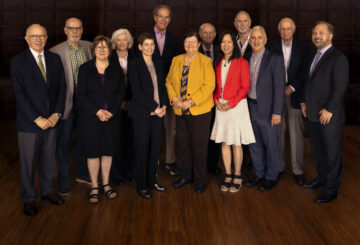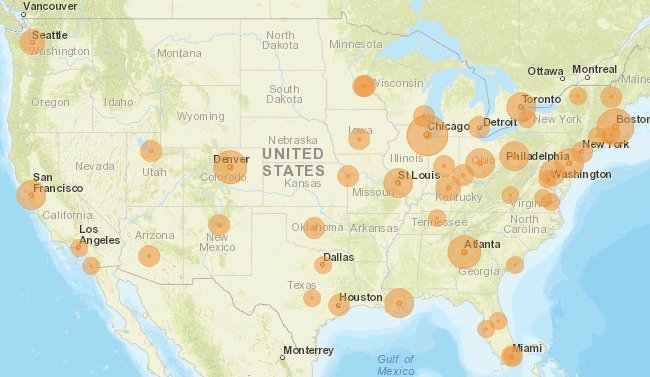 The Daniel M. Holland Medal was created in 1993 in the memory of Dan Holland, a Professor of Economics at the Massachusetts Institute of Technology Sloan School of Management, who was an internationally recognized researcher, teacher, and practitioner in public finance. The Holland Medal, which is the most prestigious award given by the NTA, recognizes lifetime achievement in the study of the theory and practice of public finance.
The Daniel M. Holland Medal was created in 1993 in the memory of Dan Holland, a Professor of Economics at the Massachusetts Institute of Technology Sloan School of Management, who was an internationally recognized researcher, teacher, and practitioner in public finance. The Holland Medal, which is the most prestigious award given by the NTA, recognizes lifetime achievement in the study of the theory and practice of public finance.
This year’s winner of the Holland Medal, James R. Hines Jr., is the L. Hart Wright Collegiate Professor of Law and co-director of the Law and Economics Program at Michigan Law. He is also the Richard A. Musgrave Collegiate Professor of Economics at University of Michigan’s Department of Economics and serves as the research director of the Office of Tax Policy Research in University of Michigan’s Stephen M. Ross School of Business. He is a research associate of the National Bureau of Economic Research, research director of the International Tax Policy Forum, former co-editor of the American Economic Association’s Journal of Economic Perspectives, and once, long ago, served as an economist in the U.S. Department of Commerce.
One of the highlights of the Annual Conference on Taxation is the plenary session in honor of the winner of the Holland Medal. This year panel’s included presentations by Alan J. Auerbach, Mihir Desai, James Poterba, and Joel Slemrod. Excerpts of their presentations appear below. There was also a video!
Alan J. Auerbach, Robert D. Burch Professor of Economics and Law, University of California, Berkeley
It is a great pleasure to join the National Tax Association in honoring Jim Hines for his richly deserved receipt of the Daniel M. Holland Medal. I have known Jim as a student, an able research assistant, a co-author writing about optimal taxation and investment behavior, a conference co-convener, and most enduringly as a friend. (He might also have been a colleague at Berkeley, had protesters not lodged themselves in trees outside his office window for the first month of his visit to Berkeley in 2008.) Many of us have been exposed to Jim’s innovative “just not in time” paper production technology, but we all wait nonetheless, knowing that what we eventually hear and read will be stimulating and thought provoking, from the paper’s catchy title to its appendix. The field of public finance would be very different, and much diminished, without Jim’s contributions over his long and continuing career.
Mihir Desai, Mizuho Financial Group Professor of Finance, Harvard Business School and Professor of Law, Harvard Law School
Jim’s four papers* changed the field and provided the roadmap for much of the next thirty years. But for our purposes, these papers also demonstrate the three most important attributes of Jim as a scholar and a person. First, he appreciates deep institutional complexity and he knows that it’s important to stay true to it in our work. I’ve found myself on more than one occasion wondering why Jim will keep harping on something seemingly irrelevant only to appreciate much later what he was talking about.
At the same time, he also knows that we have to rise above that complexity with abstraction and rigorous empirical methods. He transformed the field with his characteristically middle brow models that captured essential realities and motivated rigorous tests.
Finally, these papers are a model of integrity. He never overclaims and, if anything, provides the rebuttal to his points before you actually think of them yourself. He is completely hands on the table in his empirical methods and very generous in his citation of related research – perhaps so much so that it sometimes obscures his own contributions. That self-deprecation and generosity are of course the characteristics that you also encounter when you meet him.
As I recall, Jim introduced me to the Isaiah Berlin dichotomization between foxes and hedgehogs – and, by the way, he used that lacune, and any other opportunity I gave him, to ridicule my Brown education. But, that dichotomization is often misunderstood, including by me, as meaning that hedgehogs have big ideas that change the world and foxes traffic in little ideas. In fact, Berlin meant something quite different – in many ways, foxes are the heroes. Foxes pay attention to differences. They resist hyperbole. And they care about the underlying phenomena rather than trying to force everything into one overarching framework as hedgehogs do. I think Jim is a fox of the best kind and he made me want to be one too. And, as Berlin intimated, some special people can be both. Jim has the care and appetite of a fox but remains guided by a big idea. And that idea is not ideological. It is a way of life. It is the idea that rigorous empiricism guided by models that generate and constrain our hypotheses will make the world a better place.
*”Taxation and U.S. Multinational Investment” in Tax Policy & the Economy, edited by Larry Summers; “Coming Home to America: Dividend Repatriations by U.S. Multinationals” with Glenn Hubbard in Taxation in the Global Economy, edited by Assaf Razin and Joel Slemrod; “Credit and Deferral as International Investment Incentives” in Journal of Public Economics; and “Fiscal Paradise: Foreign Tax Havens and U.S. Business” with Eric Rice in the Quarterly Journal of Economics.
James Poterba, Mitsui Professor of Economics at MIT and President of the National Bureau of Economic Research
Jim is widely celebrated for his studies of how taxation affects the behavior of multinational firms. His contributions in public finance are much broader, however, and some of his most cited research is in quite distinct field: the study of state and local fiscal policy. His seminal 1993 paper with Anne Case and Harvey Rosen, “Budget Spillovers and Fiscal Policy Interdependence,” offered compelling evidence that states compete when choosing expenditure policies just as they do when setting tax rates. The study found intriguing patterns in the cross-state competitive patterns that move well beyond simple geographic proximity. A high-income urban state like New York, for example, might view Illinois as a closer “competitor” than nearby states like Vermont or Massachusetts. In related work, his “Altered States” paper, Jim explored the impact of interstate tax differences on the location of foreign business activity. The identification strategy underlying this paper is as ingenious as it is simple. The net burden of a U.S. state income tax on a foreign firm depends on the domestic tax treatment of foreign taxes in the country where the firm is based. The same state tax could therefore affect different firms differently — precisely what Jim finds. Finally, Jim’s paper with Nobel laureate Richard Thaler on “Anomalies: The Flypaper Effect” is a standard reference for researchers interested in how intergovernmental grants affect state and local spending.
Jim’s long and distinguished research record is impressive, but it does not fully capture Jim’s contributions to public finance. Beyond his papers, Jim has brought a remarkable energy and enthusiasm to his work. He has a gift for explaining complicated and intricate tax issues in simple terms, and for drawing other researchers, whether graduate students or very senior scholars, into the details of his research program. In this way, Jim’s influence goes well beyond his own work. He has inspired others to tackle new topics, and led by example in showing how to advance the research frontier. He is an outstanding choice for this year’s Holland Award.
Joel Slemrod, Paul W. McCracken Collegiate Professor of Business Economics and Public Policy, Stephen M. Ross School of Business and Professor of Economics, University of Michigan
Jim’s legacy to the theory and practice of taxation go far beyond his own contributions to scholarship. He has mentored a good chunk of the next generation of tax researchers; in his 20 years at Michigan, he has advised 72, yes 72!, Ph.D. dissertations, and provided instruction and guidance to many other undergraduate and graduate students. He has been an editor of both the Journal of Economic Perspectives and the Journal of Public Economics. He regularly testifies before Congressional committees on tax policy, and thus brings expert knowledge to bear on tax policy formulation. Jim does all of these things with a winning sense of humor and a gift for tying theory and research to practice and policy. All in all, he is treasure to the public economics community.
![National Tax Association [ National Tax Association ]](https://ntanet.org/wp-content/themes/nta-custom/library/images/nta-whitebg-web-top.svg)


![National Tax Association [ NTA ]](https://ntanet.org/wp-content/themes/nta-custom/library/images/nta-white-logo.svg)